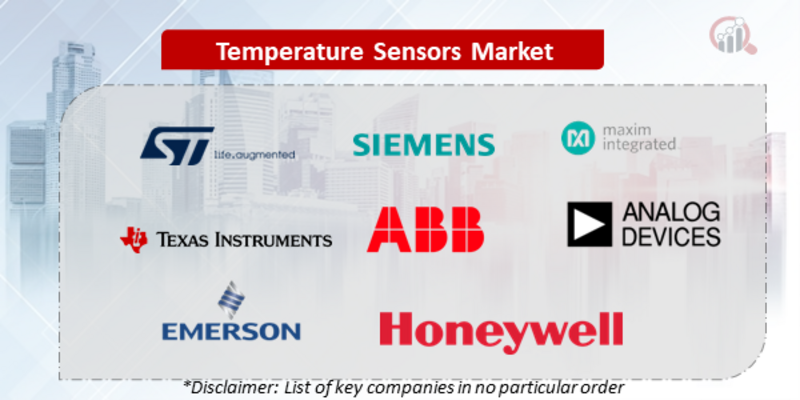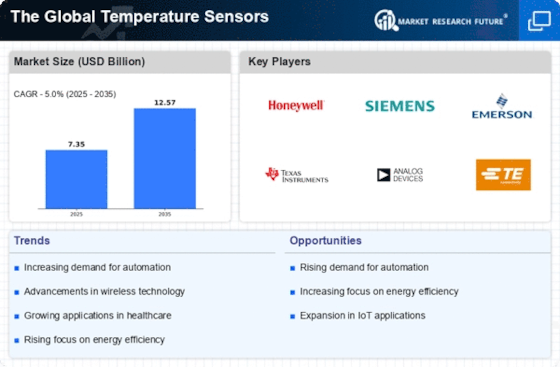Top Industry Leaders in the Temperature Sensors Market

The Competitive Landscape of the Temperature Sensors Market
From regulating your morning coffee to monitoring industrial processes, temperature sensors are the silent sentinels ensuring accuracy and control in a wide range of applications. Navigating the market behind these ubiquitous devices requires understanding the strategies at play, the factors driving market share, and the rising stars disrupting the industry. Sensors are increasingly integrating with other components like microcontrollers and wireless communication modules, creating integrated sensor solutions for enhanced functionality and data gathering.
Key Player:
- STMicroelectronics N.V.
- Siemens A G
- Ultra Electronics Holdings Plc.
- Maxim Integrated Products Inc.
- TE Connectivity
- Texas Instruments Inc.
- UTC Aerospace Systems
- ABB Limited
- Analog Devices Inc.
- Emerson Electric Corporation
- Honeywell International Inc
Strategies Adopted by Market Leaders:
-
Innovation Engine: Giants like Honeywell, Texas Instruments (TI), and NXP Semiconductors dedicate significant resources to R&D, pushing the boundaries of sensor technology. Miniaturization, enhanced accuracy, and wider temperature ranges are hallmarks of their advancements. -
Product Portfolio Breadth: Leading players offer a diverse range of sensor types catering to various needs. Thermocouples, resistance temperature detectors (RTDs), thermistors, and infrared sensors address both consumer and industrial applications. -
Vertical Specialization: Recognizing the unique requirements of different industries, established companies are tailoring their offerings. TE Connectivity, for example, focuses on high-precision sensors for medical and aerospace applications, while Infineon Technologies caters to automotive thermal management systems. -
Global Reach and Supply Chain Resilience: Building strong manufacturing and distribution networks across continents ensures market reach, rapid delivery, and mitigation of supply chain disruptions.
Factors for Market Share Analysis:
-
Performance and Accuracy: Temperature sensors are judged by their accuracy, response time, and long-term stability. Companies offering reliable and precise measurements gain an edge. -
Cost Competitiveness: Balancing performance with affordability is crucial, particularly for high-volume applications like consumer electronics and home appliances. -
Power Consumption and Form Factor: Miniaturized sensors that operate using minimal power are increasingly valued in battery-powered devices and space-constrained applications. -
Integration and Communication Protocols: Seamless integration with existing systems and compatibility with widely used communication protocols like Bluetooth and LoRa are becoming essential for smart devices and Internet of Things (IoT) applications.
New and Emerging Companies:
The market is witnessing a surge of innovative startups challenging the established order. Sensirion, for instance, specializes in microflow sensors that combine temperature and pressure measurement for advanced medical and environmental applications. Another player, SensiTech, focuses on high-temperature sensors for harsh industrial environments like steel mills and power plants. Additionally, companies like Thermometrics and Omega Engineering are developing niche solutions for specific sectors like food processing and agricultural monitoring.
Industry Development:
October 2023, Honeywell: Announced a new line of high-precision thermistors for medical and scientific applications.
November 2023, Texas Instruments: Launched a family of low-power, wireless temperature sensors for industrial automation and building management systems.
December 2023, Infineon Technologies: Unveiled a miniaturized, high-temperature MEMS sensor for automotive engine monitoring.









